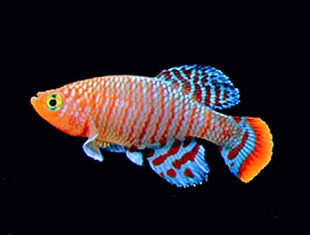 N. rachovii, a related speciesWIKIMEDIA, ANDREAS WRETSTROMThe activity of mitochondria decreases as humans get older—a trend thought to be related to worsening health. But in African turquoise killifish (Nothobranchius furzeri), the world’s shortest-lived vertebrate, there appears to be an inverse relationship between the early-life expression of genes involved in mitochondrial function and average life span, according to a study published yesterday (February 24) in Cell Systems.
N. rachovii, a related speciesWIKIMEDIA, ANDREAS WRETSTROMThe activity of mitochondria decreases as humans get older—a trend thought to be related to worsening health. But in African turquoise killifish (Nothobranchius furzeri), the world’s shortest-lived vertebrate, there appears to be an inverse relationship between the early-life expression of genes involved in mitochondrial function and average life span, according to a study published yesterday (February 24) in Cell Systems.
The researchers analyzed gene expression in fin tissue collected from 152 male killifish at various times in their 12-month lives. They found that young fish with low expression of genes involved in respiration lived longer than those who’d exhibited high expression early in life. What’s more, exposing the fish to small doses of rotenone, a natural poison that inhibits mitochondrial function, extended life span in the fish by about 15 percent.
“Up to the present, it was thought that improving mitochondrial function would improve health in aged people,” study coauthor Alessandro Cellerino of the Scuola Normale Superiore in Pisa, Italy, and the Leibniz Institute on Aging in Jena, Germany, said in a statement. “However, our results indicate a more complex scenario, where the partial inhibition ...
















